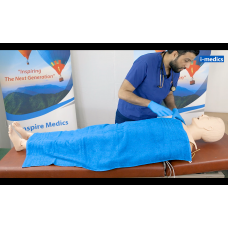DOCTOR INFORMATION
How To Pass The PLAB 2 Exam?
Table of contents:
✏ What is the PLAB 2 exam?
✏ Technical aspects of PLAB 2
✏ When can you take the PLAB 2 exam?
✏ Where can you take the PLAB 2 exam?
✏ How can you prepare for the PLAB 2?
✏ What resources are available for PLAB 2?
✏ How long does it take to prepare for the PLAB 2?
✏ What I can expect the day of PLAB 2 exam?
✏ What to bring to the PLAB 2 exam?
✏ PLAB 2 Marking ✅
✏ PLAB 2 Results
✏ After the PLAB 2 exam
✏ Summary
What is the PLAB 2 exam?
The PLAB 2 exam 📝 is the final part of the PLAB assessment that is run by the GMC. It is only taken after successful completion ✅ of the PLAB 1 exam 📝.
Every doctor looking to work in the UK 🌍 needs to complete this stage to be able to practice in the UK 🌍.
The PLAB 2 is an objective structured clinical exam 📝 (OSCE) which is made up of 18 scenarios to mirror real life clinical practice and includes acute ward/mock consultations 🏨. It tests your ability to apply knowledge to the care of patients and does not focus on how well you remember facts. The memorisation of clinical guidelines is mainly what you are expected to have done to successfully pass the PLAB 1 exam 📝.
The PLAB 2 exam 📝 covers everything a UK 🌍 trained doctor can expect to witness on their Foundation Year Two (FY2) year. The exam 📝 scenarios relate to the current best practices and as such candidates will need to consult resources based on best published UK medical evidence.
The PLAB Blueprint available on the GMC website 💻 contain the scope and content of the test, highlighting the topics, procedures and professional qualities that a successful doctor would need to be knowledgeable about or possess and be able to put to practice.
Technical aspects of PLAB 2
Prior to COVID - 19
Total exam time - 3hrs 10mins ⏱
18 stations in total with each station lasting 8 minutes. Candidates get a 90 seconds ⏱ break in between each station with 2 rest stations included.
Post COVID - 19
Total exam time - 2hrs 51mins ⏱
15 stations in total with each station lasting 8 minutes. Candidates get a 90 seconds ⏱ break in between each station with 3 rest stations included.
When can you take the PLAB 2 exam?
The PLAB 2 exam is run throughout the year and available dates are presented on the GMC official website. You can view 💻 and book for the exam 📝 under the 'My Tests' section of GMC Online.
You can only book for the exam having successfully completed the PLAB 1 exam 📝.
Where can you take the PLAB 2 exam?
The PLAB 2 exam 📝 is taken at the purpose built Clinical Assessment Centre in Manchester, UK 🌍.
Manchester is a major city in the north of England, UK 🌍.
How can you prepare for the PLAB 2 exam?
There are various resources available when preparing for the PLAB 2 exam 📝.
Academy ?
Unlike the PLAB 1 exam 📝 which has lots of study materials readily available online, for the PLAB 2 exam 📝 it is very important that you join an Academy. This is not to say that it is impossible to pass the PLAB 2 exam 📝 without being part of an Academy, but this makes the task of studying very challenging and it is not advisable.
When studying through an academy you will be provided all the study material you need and the academy will advise you on how to prepare based on their own method of preparation.
Depending on the academy, you will generally have on average 1 class everyday. It is very important that you are attentive, take notes and try to assimilate as much as you can. It is also advisable to study after the classes if time permits, spending about an hour ⏱ or two going over the days notes.
You should also find study mates 👫 who you can practice PLAB 2 stations with during any free time (before class or during breaks). It is important that you try to practice with various people to determine who you can make your 'study mates' after the academy is over. Having multiple study partners 👫 allows you to have options as well as giving you different doctors' perspectives. You also avoid making recurring mistakes as different practice partners 👫 will help to point mistakes out.
You would also need to take a days break after the completion ✅ of your course if time permits, this is essential to help you get refreshed.
After the course is completed ✅, you can choose to start the stations right away or read the notes/stations, then start practising stations.
The first method is to start practising stations right away, during the academy course. Find a partner willing to join you in practising, you can also form a group of two or three. It is advisable for the group to be no more than three people.
You should also have about four reads and practices for each case you do.
First read with your partner 👫, you both read the station once and then practice it once taking turns as the doctor and the patient. Second read with a new partner 👫, you should practice the same way as the first. The third read should be a solo one (i.e. practice by yourself), if you believe you're unable to remember certain things. The fourth read is more of practice, you find a partner and go through all the stations in one go (you may or may not read the stations before practising). You can have further practices, as much as you think you need to make you comfortable.
The second method is to read the stations/notes exhaustively before practising them. This is not the most suitable method as you might not find people willing to wait before practising, so it is best to be sure you can find a partner who is willing to use the same study method. This method begins with a first read of all the stations and then memorizing them. The second and further reads will be done with a partner 👫, practising and taking turns being the doctor 🏨 and patient.
Mocks
It is best to take mock exams when studying as they prepare you for the PLAB 2 exam 📝. It is advisable to take as many mocks as you possibly can to assess your level of preparedness, confidence and also make you comfortable with what to expect on the day.
Overall, it is advisable to go through each station 5-10 times before the exam 📝. It is all about practising.
What resources are available?
I-medics current have multiple resources available for PLAB 2 takers.
PLAB 2 videos: Learn everything you need to know to Pass the PLAB 2 exam 📝 1st time, using our 100 videos on all PLAB 2 Scenarios:
https://i-medics.co.uk/PLAB2Videocourse
PLAB 2 Notes: 100 Cases on all PLAB 2 Scenarios + BONUS notes with Examiner Mark Sheet Shown. It also includes high scoring tips.
https://i-medics.co.uk/PLABcases
PLAB 2 one day communication skills course: Full day online PLAB 2 communication skills course with 2 UK GMC registered Doctors: Dr Mo & Dr Sandoo (UK trained 🌍). Learn how to approach the different PLAB 2 scenarios and top techniques/phrases. LIVE role play to help you learn the key skills required to pass. All teaching online on Zoom, so you can attend from anywhere in the world 🌍, on your choice of our available dates.
https://i-medics.co.uk/plab2comms
PLAB 2 Coaching online: Individualised One to One, Intensive PLAB 2 Mock coaching done over Zoom/Skype with UK GMC registered doctor:
https://i-medics.co.uk/skypePLABcoaching
How long does it take to prepare for the PLAB 2 exam?
On average it takes 3-6 months to properly prepare for the PLAB 2 exam 📝, so that you can pass.
Even if you don’t have as much time as advised, you can still pass the exam 📝 with efficient preparation so do not be discouraged.
What I can expect the day of PLAB 2 exam?
On the day of the exam 📝, some scenarios will use actors to play the patient while others might have manikins or other equipment.
During the exam 📝, you will be observed by an examiner via remote camera or in person, but they will not intervene whilst the exam is ongoing except in special circumstances . The exam 📝 may also be recorded.
You are not allowed ❌ to speak to other candidates or copy any information about the exam while it is ongoing.
You are not allowed to bring any books 📙, phones or other devices into the exam 📝.
You should also dress as you would to work in a hospital ward which means no jewellery, short or rolled sleeves for male candidates, no jeans, no shorts, no sandals ?.
What to bring to the PLAB 2 exam?
You will need to bring any acceptable form of Identification such as;
a) UK driving licence
b) Passport
c) EU identity card
You can still be allowed to take the exam 📝 If you don't have one of the above but you'll be required to provide your identification document later in the process.
d) You will need to bring your booking confirmation;
Your booking confirmation will include your GMC reference number (If the name on your booking confirmation from the GMC is different from the name on your identification document, you must supply original evidence that you are the same person. Documents accepted include; marriage certificate, a declaration from the awarding body which granted your primary medical qualification, stating that both names relate to you.)
PLAB 2 Marking
The exam 📝 is marked against three domains for each scenario.
1) Data gathering, technical and assessment skills.
This domain assesses how you gather data on your patient in order to find a potential diagnosis.
Key areas assessed:
History taking: this can include past medical history, drug history 🏨 and core medical requirements
Examination 📝: everyday examinations such as cardiovascular, respiratory and abdominal examinations or model examinations such as eye, breast or other examinations. These may be tested on real-life actors or as part of an electronic simulated mannequin.
Practical procedures: such as taking blood, inserting cannulas, suturing, blood pressure measurement, common drug dose calculations and other practices that one might come across in a typical ward 🏨.
2) Clinical management skills.
This domain assesses situation management skills, both clinically and non clinically. Areas such as communicating diagnosis to patients and providing the patient with the appropriate management plan and your application of UK 🌍 current best practices. In essence, you will be assessed on how you use the information gathered to provide the patient with a diagnosis and how you manage it.
3) Interpersonal skills.
This domain assesses your ability to combine data gathering and clinical management while being c entered on the patient. How you involve the patient, how you handle challenging situations in a professional manner, your rapport with the patient and ethics amongst other areas.
The pass mark ✅ varies for each day and to be successful you will need to obtain the pass mark for that day as well as pass on at least 11 of the stations. Each case is scored out of a total of 12 marks (4marks for each of the 3 domains). The maximum mark one can get in the PLAB 2 exam 📝 is 216 marks.
PLAB 2 Results
When the PLAB 2 exams 📝 results are available, candidates will receive an email to access the results fro the GMC Online portal. You will also receive two types of feedback; qualitative and quantitative feedback.
Quantitative feedback
Tells you the marks obtained in each of the three marking domains for each station, a total across all stations. You will also be told the score you achieved in each station, the score required to pass that station, the score you achieved overall and the score required to pass the overall exam 📝
Qualitative feedback
When each station is finished, the examiner will be able to indicate which of 10 pre-set feedback statements in their opinion apply to you the most. You will be informed which feedback statements were chosen by the examiner as applying to you in each station.
After the PLAB 2 exam
You can officially apply for registration with a licence to practise when you pass the PLAB 2 exam 📝 . You can have your application for registration with a license to practice in the UK 🌍 approved if within two years of passing PLAB 2 (this is from the point you take the PLAB 2 and not the date you get your results). If you apply after the two years you will be required to provide additional evidence of your knowledge and skills.
Summary
Here are a few tips to note:
✏ You need to practice till you're confident
Related Articles
Everything you wanted to know about pass the PLAB 1 exam first time!
Everything you wanted to know on how you can pass the MRCGP AKT exam and how to prepare for it!
Everything you wanted to know on how to pass the MRCGP RCA exam


















